人教版八年级英语上册第一单元语法知识点归纳
英语人教版八年级上unit1知识点笔记

Un i t 1 Wh e re d id yo u g o on v acation?1•一般过去时考点1:如何判断一般过去时?考点2:肯定句变否定句。
考点3:变一般疑问和特殊疑问句。
2•复合不定代词/副词构成: _________ _________ ___________ _________其中:(no one意思“______ ”指 __ ,与_________ 同义,且与of连用,做主语谓语用单三。
回答引起的特殊疑问句时要用no one.none意思“ ___ ”,指____________ ,且 __ 与of连用。
谓语单,复形式皆可。
回答 _________ 引起的特殊疑问句时要用none;-anyone意思" _____ ”扌旨___ ,与 __ 同义,且_____ 与of连用。
_any one 意思" ____ ”扌旨___ ,与 __ 同义,且_____ 与of 连用。
nothing= _________________用法:① 复合不定代词做主语,谓语动词用 ________ •②当adj.修饰不定代词要_________ •③ 当不定代词中含有some通常用于__________ ;含有any通常用于_______________我自己myself你自己他自己她自己它自己我们自己你们自己他们自己反身代词在句中可用作动词宾语、介词宾语、表语和同位语等,如:She can dress herself.作动词宾语)That?poor?boy?was?myself.(用作表语)Thefatherhimselfhassomething wrong.(同位语:句中常置于名词、代词之后或句子末尾We clean the room ourselves.(同位语:句中常置于名词、代词之后或句子末尾常用短语:穿衣服;?玩得快乐;随便吃;随便用;2.few 意为___________,修饰__________ 名词,倾向于否定。
人教版八年级英语上册第一单元语法知识点归纳

人教版八年级英语上册第一单元语法知识点归纳一、词组、短语:1、go on vacation去度假;2、stay at home 呆在家;3、go to the mountains 上山/进山;4、go to the beach到海边去;5、visit museums 参观博物馆;6、go to summer camp 去夏令营;7、quite a few 相当多;8、study for为……学习;9、go out 出去;10、most of the time大部分时间/绝大多数时间;11、taste good 尝起来味道好;12、have a good time玩的开心;13、of course当然可以;14、feel like感觉像……/想要;15、go shopping购物;16、in the past 在过去;17、walk around绕……走;18、too many 太多(可数名词前面);19、because of 因为;20、one bowl of 一碗……;21、find out 查出来/发现;22、go on继续;23、take photos 照相;24、something important重要的事情;25、up and down上上下下;26、p出来二、习惯用法、搭配1. buy sth. for ab./ buy sb. sth. 为某人买某物2. taste + adj. 尝起来……3. nothing ….but + V.(原形) 除了……之外什么都没有4. seem + (to be) + adj 看起来5. arrive in + 大地方/ arrive at + 小地方到达某地6. decide to do sth. 决定做某事7. try doing sth. 尝试做某事/ try to do sth. 尽力做某事8. enjoy doing sth. 喜欢做某事9. want to do sth. 想去做某事10. start doing sth. 开始做某事11. stop doing sth. 停止做某事12. look + adj 看起来13. dislike doing sth. 不喜欢做某事14. Why not do sth. 为什么不做…….呢?15. so + adj + that + 从句如此……以至于……16. tell sb. (not) to do sth. 告诉某人(不要)做某事17. keep doing sth. 继续做某事18. forget to do sth. 忘记去做某事/ forget doing sth 忘记做过某事三、重点句子1. Where did you go on vacation? 你去哪儿度假的?1)这是一个由疑问副词where引导的特殊疑问句。
人教版八年级英语上册第一单元知识点归纳
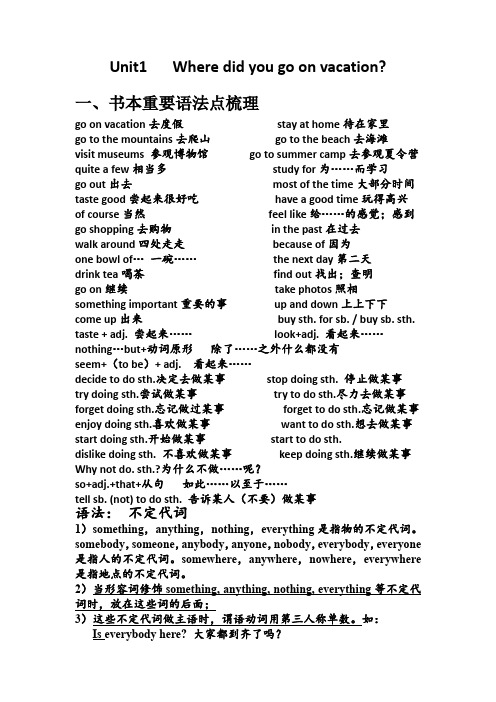
Unit1 Where did you go on vacation?一、书本重要语法点梳理go on vacation去度假stay at home待在家里go to the mountains去爬山go to the beach去海滩visit museums 参观博物馆go to summer camp去参观夏令营quite a few相当多study for为……而学习go out出去most of the time大部分时间taste good尝起来很好吃have a good time玩得高兴of course当然feel like给……的感觉;感到go shopping去购物in the past在过去walk around四处走走because of因为one bowl of…一碗……the next day第二天drink tea喝茶find out找出;查明go on继续take photos照相something important重要的事up and down上上下下come up出来buy sth. for sb. / buy sb. sth. taste + adj. 尝起来……look+adj. 看起来……nothing…but+动词原形除了……之外什么都没有seem+(to be)+ adj. 看起来……decide to do sth.决定去做某事stop doing sth. 停止做某事try doing sth.尝试做某事try to do sth.尽力去做某事forget doing sth.忘记做过某事forget to do sth.忘记做某事enjoy doing sth.喜欢做某事want to do sth.想去做某事start doing sth.开始做某事start to do sth.dislike doing sth. 不喜欢做某事keep doing sth.继续做某事Why not do. sth.?为什么不做……呢?so+adj.+that+从句如此……以至于……tell sb. (not) to do sth. 告诉某人(不要)做某事语法:不定代词1)something,anything,nothing,everything是指物的不定代词。
人教版八年级英语核心语法考点归纳

人教版八年级英语核心语法考点归纳八年级上册Unit 1考点一:复合不定代词复合不定代词由some, any, no, every 与one, body, thing 构成。
在使用复合不定代词时应注意以下几点:1. some- 一般用于肯定句中,any- 一般用于否定句或疑问句中,在表示请求、建议或期望得到肯定回答时,常用some- 构成的复合不定代词;2. 复合不定代词作主语时按单数看待;3. 形容词或else 修饰复合不定代词的时候应后置。
考点二:一般过去时定义:一般过去时表示过去某个时间发生的动作或存在的状态,也可表示过去经常发生的习惯性的动作或行为。
结构:主语+ 动词过去式+ 其他;主语+was / were + 其他。
常用时见壮语:yesterday, two years ago, last week, just now 等。
1.The old man _____ in Shanghai, but he _____ in Haikou now.A.be born; liveB.was born ; liveC.is born; livesD.was born; lives2. —Where were you last Saturday?—I ____ in the Capital Museum.A. amB. will beC. wasD. have been八年级上册Unit 2考点一:拼读副词频度副词表示动作或行为发生的频率。
常见的频度副词及其发生的频率如下表:考点二:how 疑问词组练一练3.()do you usually go to school,Simon? -by bike.A.WhenB.HowC.WhatD.Where(答案在文末获取)八年级上册Unit 3考点一:形容词和副词的比较级形容词和副词的比较能表示两者之间的比较关系,表示A 比B 更……,通常用than 来连接。
人教版八年级上册英语Unit 1 知识点语法归纳总结
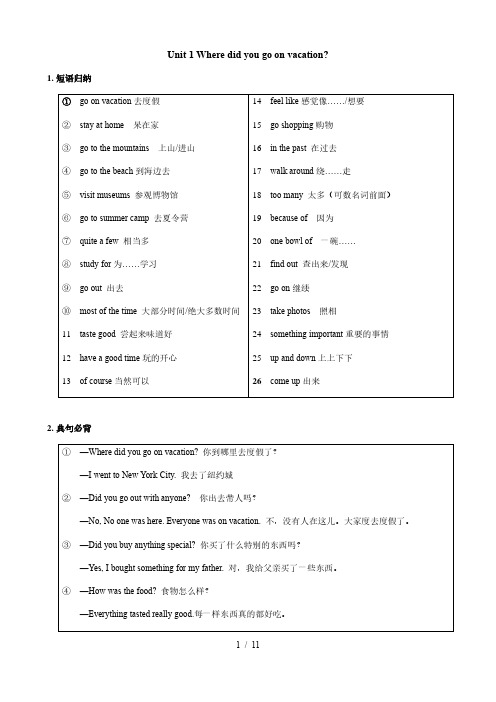
Unit 1 Where did you go on vacation?1.短语归纳2.典句必背3.用法集萃(1)—Where did you go on vacation? 你去哪里度假了?—I went to the mountains. 我去爬山了。
❖Where did you...? 是一般过去时的特殊疑问句,其句式结构为:疑问词+did+主语+动词原形+其他成分?其中did是助动词,没有人称和数的变化,实义动词要用原形。
例:What did you do yesterday afternoon? 你昨天下午干什么了?I played tennis with my friend. 我和我的朋友一起打网球了。
❖on vacation意为“在度假”。
例:My family went to Hainan on vacation last year. 我家人去年去海南度假了。
(2)Oh, did you go anywhere interesting? 哦,你去什么有趣的地方了吗?❖anywhere是副词,意思是“任何地方;无论何处”,常用于否定句、疑问句或条件状语从句中。
例:I cannot find it anywhere. 我在什么地方都没找到它。
Are you going anywhere tonight? 今晚你要去什么地方吗?If you go anywhere, take me with you. 你要是去什么地方,带我一起去。
❖若是肯定句中说某个地方,应用somewhere。
例:I remember seeing him somewhere. 我记得在哪儿见过他❖somewhere/anywhere有时与修饰语连用,这时候,其修饰语要置于somewhere/ anywhere之后。
例:You can go anywhere interesting if you want. 如果你想,你可以去任何一个有趣的地方。
人教版英语八年级上第一单元Unit1Wheredidyougoonvacation知识点梳理

人教版英语八年级上第一单元Unit1Wheredidyougoonvacation知识点梳理Unit 1 Where did you go on vacation?知识梳理一、词型转换Section A1.wonder →(adj.) wonderful2.I →(反身代词) myself3.you →(反身代词) yourself4.yourself →(pl.) yourselves5.seem →(pt.) seemedSection B1.activity →(pl.) activities2.decide →(n.) decision3.try →(pt.) tried4.bike →(同义词) bicycle5.build →(n.) building6.difference →(adj.) different7.like →(反义词) dislike8.below →(反义词) above二、短语归纳Section A1.go to Central Park 去中央公园2.on vacation 在度假3.buy something special 买特别的东西4.meet someone interesing 遇见有趣的人5.go out with someone 和某人一起出去6.take quite a few photos 拍相当多的照片7.most of the time 大多数时间8.go shopping 去购物9.keep a diary 记日记10.of course 当然;自然Section B1.have a good time 玩得高兴;过得愉快2.go to the beach 去海滩3.feel like 感觉像4.the houses of the Chinese traders 中国商人的房子5. a lot of new buildings 许多新的建筑物6.in the past 在过去7.over an hour 一个多小时8.too many people 太多的人9.get to the top 到达顶部10.because of the bad weather 因为不好的天气11.one bowl of fish 一碗鱼肉12.another two hours 另外两个小时13.the top of the hill 山顶14.learn something important 学习重要的东西Self Check1.go to the countryside 去乡下2.in the shopping center 在购物中心3.have a fun time 玩得高兴;过得愉快4.after three hours 三个小时以后5.keep going 一直走6.twenty minutes later 20分钟后重点句子1.Where did you go on vacation?你去哪儿度假的?2.Long time no see.好久不见。
新人教版八年级上册英语单元语法及知识点归纳

新人教版八年级上册英语单元语法及知识点归纳-CAL-FENGHAI.-(YICAI)-Company One1新人教版八年级上册英语单元语法及知识点归纳Unit1 Where did you go on vacation?【重点语法】不定代词:不指名代替任何特定名词或形容词的代词叫做不定代词。
用法注意:1. some 和any +可数名/不可数名。
some 多用于肯定句,any多用于否定句、疑问句和条件从句。
有些问句中用some,不用any, 问话者希望得到对方肯定回答。
2. 由some, any, no, every 与 body, one, thing构成的复合不定代词作主语时,其谓语动词用三单。
3. 不定代词若有定语修饰,该定语要置于其后:如:something interesting【重点短语】1. buy sth for ab./ buy sb. sth 为某人买某物2. taste + adj. 尝起来……3. nothing...but + V.(原形) 除了……之外什么都没有4. seem + (to be) + adj 看起来5. arrive in + 大地方 / arrive at + 小地方到达某地6. decide to do sth. 决定做某事7. try doing sth. 尝试做某事 / try to do sth. 尽力做某事8. enjoy doing sth. 喜欢做某事9. want to do sth. 想去做某事10. start doing sth. 开始做某事=begin doing sth.11. stop doing sth. 停止做某事区分: stop to do sth. 停下来去做某事12. dislike doing sth. 不喜欢做某事14. so + adj + that + 从句如此……以至于……16. tell sb. (not) to do sth. 告诉某人(不要)做某事17. keep doing sth. 继续做某事18. forget to do sth. 忘记去做某事 / forget doing sth 忘记做过某事【词语辨析】1. take a photo/ take photos 拍照quite a few+名词复数“许多…”2. seem + 形容词看起来…... You seem happy today.seem + to do sth. 似乎/好像做某事 I seem to have a coldIt seems + 从句似乎..…. It seems that no one believe you.seem like ... 好像,似乎….. It seems like a good idea.3. arrive in +大地点= get to= reach+地点名“到达......”arrive at +小地点(注:若后跟地点副词here/there/home, 介词需省略,如: arrive here; get home)4. feel like sth 感觉像…feel doing sth. 想要做某事5. wonder(想知道)+疑问词(who, what, why)引导的从句。
人教版英语八年级上册unit 1

人教版英语八年级上册unit 1一、重点单词。
1. anyone.- 词性:不定代词,意为“任何人”,用于否定句和疑问句中。
例如:Did you meet anyone interesting at the party?(你在聚会上遇到有趣的人了吗?)2. anywhere?- 词性:副词,意为“在任何地方;无论何处”。
例如:I can't find my keys anywhere.(我到处都找不到我的钥匙。
)3. wonderful.- 词性:形容词,意为“精彩的;绝妙的”。
例如:We had a wonderful timeat the concert.(我们在音乐会上度过了一段美妙的时光。
)4. few.- 词性:形容词,意为“不多;很少”,修饰可数名词复数,表示否定意义。
例如:There are few apples on the tree.(树上几乎没有苹果了。
)- 区别:a few表示“一些;几个”,表示肯定意义。
例如:There are a few students in the classroom.(教室里有几个学生。
)5. most.- 词性:形容词,意为“最多的;大多数的”。
例如:Most students like English.(大多数学生喜欢英语。
)- 也可作副词,意为“最;非常”。
例如:This is the most beautiful flower.(这是最漂亮的花。
)6. something.- 词性:不定代词,意为“某事;某物”,用于肯定句中。
例如:I have something important to tell you.(我有重要的事情要告诉你。
)7. nothing.- 词性:不定代词,意为“没有什么;没有一件东西”。
例如:There is nothing in the box.(盒子里什么都没有。
)8. everyone.- 词性:不定代词,意为“每人;人人;所有人”。
八年级上册英语单元语法及知识点归纳
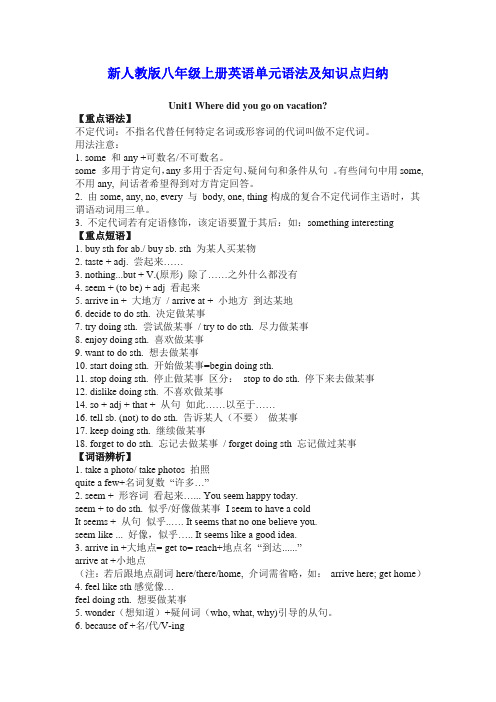
新人教版八年级上册英语单元语法及知识点归纳Unit1 Where did you go on vacation?【重点语法】不定代词:不指名代替任何特定名词或形容词的代词叫做不定代词。
用法注意:1. some 和any +可数名/不可数名。
some 多用于肯定句,any多用于否定句、疑问句和条件从句。
有些问句中用some,不用any, 问话者希望得到对方肯定回答。
2. 由some, any, no, every 与body, one, thing构成的复合不定代词作主语时,其谓语动词用三单。
3. 不定代词若有定语修饰,该定语要置于其后:如:something interesting【重点短语】1. buy sth for ab./ buy sb. sth 为某人买某物2. taste + adj. 尝起来……3. nothing...but + V.(原形) 除了……之外什么都没有4. seem + (to be) + adj 看起来5. arrive in + 大地方/ arrive at + 小地方到达某地6. decide to do sth. 决定做某事7. try doing sth. 尝试做某事/ try to do sth. 尽力做某事8. enjoy doing sth. 喜欢做某事9. want to do sth. 想去做某事10. start doing sth. 开始做某事=begin doing sth.11. stop doing sth. 停止做某事区分:stop to do sth. 停下来去做某事12. dislike doing sth. 不喜欢做某事14. so + adj + that + 从句如此……以至于……16. tell sb. (not) to do sth. 告诉某人(不要)做某事17. keep doing sth. 继续做某事18. forget to do sth. 忘记去做某事/ forget doing sth 忘记做过某事【词语辨析】1. take a photo/ take photos 拍照quite a few+名词复数“许多…”2. seem + 形容词看起来…... You seem happy today.seem + to do sth. 似乎/好像做某事I seem to have a coldIt seems + 从句似乎..…. It seems that no one believe you.seem like ... 好像,似乎….. It seems like a good idea.3. arrive in +大地点= get to= reach+地点名“到达......”arrive at +小地点(注:若后跟地点副词here/there/home, 介词需省略,如:arrive here; get home)4. feel like sth 感觉像…feel doing sth. 想要做某事5. wonder(想知道)+疑问词(who, what, why)引导的从句。
人教版八年级上册英语Unit 1 知识点语法点及课后习题

Unit 1Key words(重点单词):anyone, anywhere, wonderful, few, most, something, nothing, everyone, myself, yourself, hen, pig, seem, bored, someone, diary, enjoyable, activity,decide, try, bird, bicycle, building, trader, wonder, difference, top, wait, umbrella, wet, below, enough, hungry, as, hill, duck, dislike,(任何人,在任何地方,精彩的,不多,最多,某事,没有什么,每人,我自己,你自己,母鸡,猪,好像,厌倦的,某人,日记,有乐趣的,活动,决定,尝试,鸟,自行车,建筑物,商人,想知道,差别,顶部,等待,伞,湿的,在…下面,足够的,饥饿的,如同,小山,鸭,不喜欢)语法:一般过去时的用法1.一般过去时:概念:一般过去时用来表示过去某一时间内发生的动作或存在的状态以及过去习惯性,反复性的动作。
谓语动词要用动词的过去式,常和表示过去的时间状语连用,如yesterday,last night, last week, last year 等。
例句:Where did you go on vacation?I went to New York City.(你去哪里度假了?我去纽约度假了。
)Did you go out with anyone?No. No one was here. Everyone was on vacation.(你和谁出去了吗?没有。
没有人在这里。
每个人都在度假。
)Did you buy anything special ?Yes, I bought something for my father.No, I bought nothing.(你买了什么特别的东西吗?是的,我给我爸爸买了东西。
人教版初中英语八年级上册Unit1知识点总结
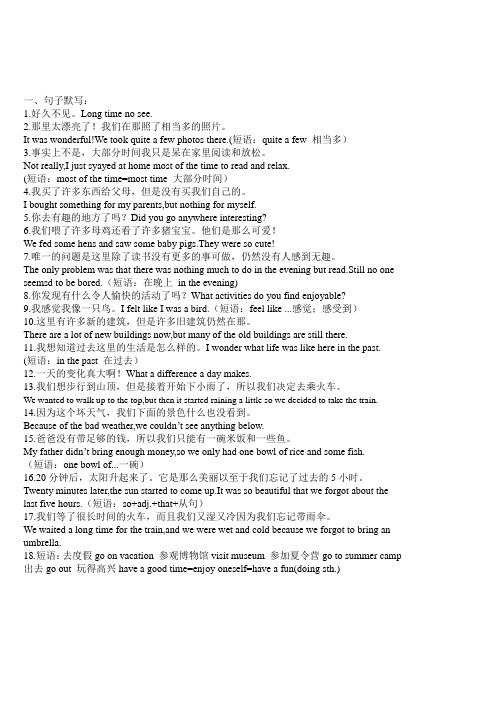
一、句子默写:1.好久不见。
Long time no see.2.那里太漂亮了!我们在那照了相当多的照片。
It was wonderful!We took quite a few photos there.(短语:quite a few 相当多)3.事实上不是,大部分时间我只是呆在家里阅读和放松。
Not really,I just syayed at home most of the time to read and relax.(短语:most of the time=most time 大部分时间)4.我买了许多东西给父母,但是没有买我们自己的。
I bought something for my parents,but nothing for myself.5.你去有趣的地方了吗?Did you go anywhere interesting?6.我们喂了许多母鸡还看了许多猪宝宝。
他们是那么可爱!We fed some hens and saw some baby pigs.They were so cute!7.唯一的问题是这里除了读书没有更多的事可做,仍然没有人感到无趣。
The only problem was that there was nothing much to do in the evening but read.Still no one seemsd to be bored.(短语:在晚上in the evening)8.你发现有什么令人愉快的活动了吗?What activities do you find enjoyable?9.我感觉我像一只鸟。
I felt like I was a bird.(短语:feel like ...感觉;感受到)10.这里有许多新的建筑,但是许多旧建筑仍然在那。
There are a lot of new buildings now,but many of the old buildings are still there.11.我想知道过去这里的生活是怎么样的。
人教版八年级上册英语Unit 1 知识点语法归纳总结
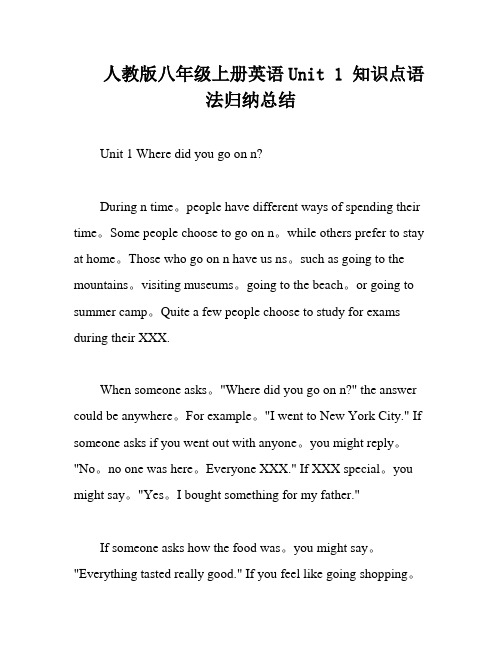
人教版八年级上册英语Unit 1 知识点语法归纳总结Unit 1 Where did you go on n?During n time。
people have different ways of spending their time。
Some people choose to go on n。
while others prefer to stay at home。
Those who go on n have us ns。
such as going to the mountains。
visiting museums。
going to the beach。
or going to summer camp。
Quite a few people choose to study for exams during their XXX.When someone asks。
"Where did you go on n?" the answer could be anywhere。
For example。
"I went to New York City." If someone asks if you went out with anyone。
you might reply。
"No。
no one was here。
Everyone XXX." If XXX special。
you might say。
"Yes。
I bought something for my father."If someone asks how the food was。
you might say。
"Everything tasted really good." If you feel like going shopping。
you might say。
人教版英语八年级上册第一单元知识点总结

Unit11. 疑问词how的用法(1)用什么手段,方法/交通工具How did he do it? / I don’t know how to swim.How do you come to school?(2)情况如何(指身体健康状况)How are you?(3) how many,how much表示“多少"how many后接可数名词复数,how much接不可数名词。
(4)how often是对动作发生的“次数"提问,询问的是频率“多久一次”(5)How old。
.?询问年龄How old are you?I am five.(6) How about…? ……如何?……怎么样?How about going to the movies?2. time表示不可数名词,意为“时间”。
What time is it?表示可数名词,意为“次数,倍数"—-—-————注意“次数"的表达方法一次 once,两次 twice,三次或三次以上用基数词加上times:three times、five times、one hundred times.表示“……几次”的表达方法是:once a day/ a week/ a month/ a year twice a day/ a week/ a month/ a year 3.How often do you shop?/How often do you exercise?--—-————exercise v/n shop v/ n1)He often exercises on weekends. We often do / take exercise(做运动)on weekends。
2)We often shop on weekends。
There are many shops in the neighborhood.4. As for homework,most students do homework every day。
人教版八年级英语上册知识点总结
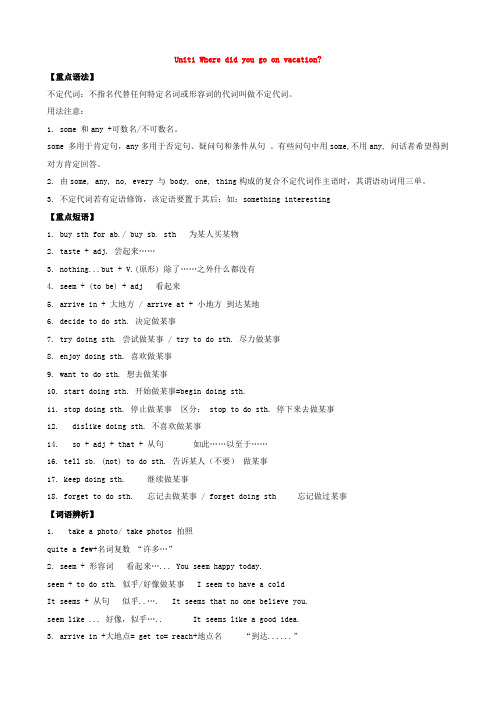
Unit1 Where did you go on vacation?【重点语法】不定代词:不指名代替任何特定名词或形容词的代词叫做不定代词。
用法注意:1. some 和any +可数名/不可数名。
some 多用于肯定句,any多用于否定句、疑问句和条件从句。
有些问句中用some,不用any, 问话者希望得到对方肯定回答。
2. 由some, any, no, every 与 body, one, thing构成的复合不定代词作主语时,其谓语动词用三单。
3. 不定代词若有定语修饰,该定语要置于其后:如:something interesting【重点短语】1. buy sth for ab./ buy sb. sth 为某人买某物2. taste + adj. 尝起来……3. nothing...but + V.(原形) 除了……之外什么都没有4. seem + (to be) + adj 看起来5. arrive in + 大地方 / arrive at + 小地方到达某地6. decide to do sth. 决定做某事7. try doing sth. 尝试做某事 / try to do sth. 尽力做某事8. enjoy doing sth. 喜欢做某事9. want to do sth. 想去做某事10. start doing sth. 开始做某事=begin doing sth.11. stop doing sth. 停止做某事区分: stop to do sth. 停下来去做某事12. dislike doing sth. 不喜欢做某事14. so + adj + that + 从句如此……以至于……16. tell sb. (not) to do sth. 告诉某人(不要)做某事17. keep doing sth. 继续做某事18. forget to do sth. 忘记去做某事 / forget doing sth 忘记做过某事【词语辨析】1. take a photo/ take photos 拍照quite a few+名词复数“许多…”2. seem + 形容词看起来…... You seem happy today.seem + to do sth. 似乎/好像做某事I seem to have a coldIt seems + 从句似乎..…. It seems that no one believe you.seem like ... 好像,似乎….. It seems like a good idea.arrive at +小地点(注:若后跟地点副词here/there/home, 介词需省略,如: arrive here; get home)4. feel like sth 感觉像…feel doing sth. 想要做某事5. wonder(想知道)+疑问词(who, what, why)引导的从句。
人教版英语八年级上册第一单元知识点汇总

人教版英语八年级上册第一单元知识点汇总Unit 1 Where did you go on vacation?一、词汇短语单词:1.anyone pron. 任何人2.anywhere adv. 任何地方3.wonderful adj. 精彩的;绝妙的4.few adj.&pron. 不多;很少5.quite a few 相当多;不少6.most adj.&adv. 最多的;大多数7.something pron. 某事;某物8.nothing pron.没有什么;没有一件东西9.everyone pron. 每人;人人;所有人10.of course 当然;自然11.myself pron. 我自己;我本人12.yourself (pl. yourselves) pron. 你自己;您自己13.hen n. 母鸡14.pig n. 猪15.seem v. 好像;似乎;看来16.bored adj. 厌倦的;烦闷的17. someone pron. 某人18.diary n. 日记;日记簿19.activity n. 活动20.decide v. 决定;选定21.try v.&n. 尝试;设法;努力22.paragliding n. 滑翔伞运动23.feel like 给……的感觉;感受到24.bird n. 鸟25.bicycle n. 自行车;脚踏车26.building n. 建筑物;房子27.trader n. 商人28.wonder v. 想知道;琢磨29.difference n. 差别;差异30.top n. 顶部;表面31.wait v. 等待;等候32.umbrella n. 伞;雨伞33.wet adj. 湿的;潮湿的;下雨的34. because of 因为35.below prep.&adv. 在... 下面;到……下面36.enough adj.&adv. 足够的(地);充足的(地);充分的(地)37. hungry adj. 饥饿的38.as adv. 像... 一样;如同39. hill n. 小山;山丘40. duck n. 鸭41.dislike v.&n. 不喜爱(的事物);厌恶(的事物)短语:1.go to the mountains 去爬山2.visit museums 参观博物馆3.go to the beach 去海滩4.quite a few 相当多5.study for为······而学习6.most of the time 大部分时间14.taste good 尝起来很好吃15.have a good time 玩得高兴16.feel like 给······的感觉;感受到17.one bowl of···一碗··18.go shopping 去购物19.walk around 四处走走7.because of 因为8.take photos 照相9.go on 继续20.find out 找出;查明21.the next day 第二天22.buy sth.for sb./buy sb.sth.为某人买e up 出来11.up and down 上上下下12.something important 重要的事23.look+adj.看起来....24.taste+adj.尝起来....25.seem+(to be)+adj. 看起来....13.n othing···but+动词原形??了······之外什么都没有二、重点句型1.Where did you go on vacation? 你去哪儿度假了?2.Long time no see.好久不见。
新人教版八年级上册英语单元语法及知识点归纳汇总

新人教版八年级上册英语单元语法及知识点归纳Unit1 Where did you go on vacation?【重点语法】不定代词:不指名代替任何特定名词或形容词的代词叫做不定代词。
用法注意:1. some 和any +可数名/不可数名。
some 多用于肯定句,any多用于否定句、疑问句和条件从句。
有些问句中用some,不用any, 问话者希望得到对方肯定回答。
2. 由some, any, no, every 与body, one, thing构成的复合不定代词作主语时,其谓语动词用三单。
3. 不定代词若有定语修饰,该定语要置于其后:如:something interesting【重点短语】1. buy sth for ab./ buy sb. sth 为某人买某物2. taste + adj. 尝起来……3. nothing...but + V.(原形) 除了……之外什么都没有4. seem + (to be) + adj 看起来5. arrive in + 大地方/ arrive at + 小地方到达某地6. decide to do sth. 决定做某事7. try doing sth. 尝试做某事/ try to do sth. 尽力做某事8. enjoy doing sth. 喜欢做某事9. want to do sth. 想去做某事10. start doing sth. 开始做某事=begin doing sth.11. stop doing sth. 停止做某事区分:stop to do sth. 停下来去做某事12. dislike doing sth. 不喜欢做某事14. so + adj + that + 从句如此……以至于……16. tell sb. (not) to do sth. 告诉某人(不要)做某事17. keep doing sth. 继续做某事18. forget to do sth. 忘记去做某事/ forget doing sth 忘记做过某事【词语辨析】1. take a photo/ take photos 拍照quite a few+名词复数“许多…”2. seem + 形容词看起来…... You seem happy today.seem + to do sth. 似乎/好像做某事I seem to have a coldIt seems + 从句似乎..…. It seems that no one believe you.seem like ... 好像,似乎….. It seems like a good idea.3. arrive in +大地点= get to= reach+地点名“到达......”arrive at +小地点(注:若后跟地点副词here/there/home, 介词需省略,如:arrive here; get home)4. feel like sth 感觉像…feel doing sth. 想要做某事5. wonder(想知道)+疑问词(who, what, why)引导的从句。
- 1、下载文档前请自行甄别文档内容的完整性,平台不提供额外的编辑、内容补充、找答案等附加服务。
- 2、"仅部分预览"的文档,不可在线预览部分如存在完整性等问题,可反馈申请退款(可完整预览的文档不适用该条件!)。
- 3、如文档侵犯您的权益,请联系客服反馈,我们会尽快为您处理(人工客服工作时间:9:00-18:30)。
Unit 1一、词组、短语:1、go on vacation 去度假,2、stay at home呆在家,3、go to the mountains上山 /进山,4、go to the beach 到海边去,5、visit museums参观博物馆,6、go to summer camp 去夏令营,7、quite a few 相当多,8、study for 为 ,,学习,9、go out 出去,10、most of the time 大部分时间 / 绝大多数时间,11、taste good 尝起来味道好,12、have a good time 玩的开心,13、of course 当然可以,14、feel like 感觉像 ,, / 想要 ,15、go shopping 购物,16、in the past 在过去,17、 walk around绕,, 走,18、too many 太多(可数名词前面),19、because of因为,20、one bowl of一碗 ,,,21、find out 查出来 / 发现,22、go on 继续,23、take photos照相,24、something important重要的事情,25、up and down 上上下下,26、come up 出来二、习惯用法、搭配1.buy sth. for ab./ buy sb. sth. 为某人买某物2.taste + adj. 尝起来 ,,3.nothing , .but + V.(原形 ) 除了 ,, 之外什么都没有4. seem + (to be) + adj看起来5. arrive in + 大地方/ arrive at +小地方到达某地6. decide to do sth.决定做某事7. try doing sth.尝试做某事/ try to do sth.尽力做某事8.enjoy doing sth. 喜欢做某事9.want to do sth. 想去做某事10.start doing sth. 开始做某事11.stop doing sth. 停止做某事12.look + adj 看起来13.dislike doing sth. 不喜欢做某事14. Why not do sth.为什么不做,,.呢?15. so + adj + that + 从句如此,,以至于,,16. tell sb. (not) to do sth.告诉某人(不要)做某事17. keep doing sth.继续做某事18. forget to do sth.忘记去做某事/ forget doing sth忘记做过某事三、重点句子1. Where did you go on vacation?你去哪儿度假的?1)这是一个由疑问副词where 引导的特殊疑问句。
Where 用来询问地点或场所,用于句首,其后跟一般疑问句。
如: Where are you from ?Where does he live ?2)go on vacation “去度假”He will go on vacation with his family.他要和家人一起度假。
【解析】vacation [v ?'ke??n] n 假期= holidayon vacation 在度假take a vacation 去度假winter vacation寒假summer vacation暑假①I have a lot of _______________every year . (vacation)() ② — Where did Sarah go on vacation?—She went to America.A. on vacationB. take a vacationC. is on vacationD. is for vacation2、Did you go with anyone?你和别人一起去的吗?这是一个一般过去时的一般疑问句。
当含有实义动词的一般过去时的陈述句变为一般疑问句时,需借助助动词did,此时后面的实义动词应用原形。
其句型结构为“did+主语 +动词原形 +其它?”,肯定回答为“Yes,主语 +did”,否定回答为“ No,主语 +didn′ t” ·基本用法pron. anyone任何人,相当于anybody ,通常用在否定句、疑问句或条件从句中。
如:I won ?t tell anyone I saw you here.我不会告诉任何人我在这儿见过你。
Why would anyone want that job?为什么会有人想要那份工作呢?知识拓展---同类词Some- any-no-every-指人someone 有人指物something某物指地点somewhere某地注意:anyone 任何人anybodyanything 任何事anywhere 任何地方no onenothingnowhere没有人 nobody没有事无处,没有地方everyone 人人everybodyeverything一切事everywhere到处(1)由 some-, any-, no-, every- 构成的符合不定代词作主语时,都作单数看待,其谓语动词用第三人称单数形式。
(2)不定代词若有定语修饰,该定语要置于其后,作后置定语。
如:I?d like something to drink.我想要些喝的。
Is there anything interesting in the book?这本书中有有趣的东西吗?小结:【解析 1】 someone [s?mw?n] pron 某人 anyone [eniw ?n] pron任何人everyone [evriw ?n] pron每人,人人3.visited my uncle看望了我的叔叔visit是及物动词,意为“拜访;探望”,后接表示人的名词或代词。
visit还可以意为“参观;游览”,后接表示地点的名词。
a. I visited my grandmother last week.b. b.Do you want to visit Shanghai?上周我去 ______了我的外婆。
你想 ______上海吗?拓展: visitor 意为“参观者;游客”。
These visitors come from America.____________________3.buy anything special买特别的东西。
(P2)1)buy 及物动词,意为“买;购买”。
其过去式为______。
拓展: buy sth. for sb.=buy sb. sth.意为“给某人买某物” 。
My uncle_____ _____a bike.= My uncle_____ _____for me.2)anything 不定代词,意为“某事;某件东西” ,主要用于疑问句或否定句中。
a. Do you want to buy anything for me?b.I can?t say anything about it.3)anthing special 表示“特别的东西” ,形容词修饰不定代词时后置。
Is there________ ________in this book? 这本书里有新的内容吗?4.Oh, did you go anywhere interesting?哦,你去有趣的地方了吗?(P2)1)本句是did 开头的一般疑问句2)anywhere 用作副词,意为“在任何地方”。
eg: Did you go anywhere during the summer vacation ?辨析: anywhere 与 somewhereanywhere 意为“在任何地方” ,常用于否定句和疑问句中。
eg:I can?t find it anywhere.somewhere 意为“在某处;到某处”,常用于肯定句中。
eg:I lost my key somewhere near here.5.We took quite a few photos there. 我们在那里拍了不少照片。
(P2)take photos意为“照相;拍照” 。
eg:We______ ______on the Great Wall.我们在长城上照了相。
辨析: quite a few 与 quite a littlequite a few意为“很多;不少”,修饰可数名词复数;quite a little意为“很多;不少”,修饰不可数名词。
a. He stays here for _____ _____ _____days.b.There is _____ _____ _____water in the bottle( 瓶子 ).6. I just stayed at home most of the time to read and relax.我大部分时间只是待在家里读书休息。
(P2)most of the time意为“大部分时间” ,其中most为代词,意为“大部分;大多数”拓展 most of , 意为“ ,, 中的大多数”,它作主语时,谓语动词取决于most of 后所修饰的名词。
a.Most of us_____(be)going to the park.我们大多数人要去公园。
b. Most of the food_____(go)bad.大部分的食物都变质了。
7. Everything tasted really good! 所有的东西尝起来真的很好吃!(P3)taste 在此为系动词,意为“尝起来”,其后接形容词构成系表结构。
a. The food tastes really great. 食物尝起来棒极了。
8. Did everyone have a good time? 大家都玩得很开心吗?(P3)have a good time = enjoy oneself = have fun玩得开心(+ doing)eg: We had a good time visiting the the Great Wall. = We enjoyed ourselves visiting the the Great Wall.= We had fun visiting the the Great Wall.9.How did you like it?你觉得它怎么样?(P3)How do/did you like ,,? 意为“你觉得,, 怎么样?”,用来询问对方的观点或看法,相当What do you think of ,,? eg: How do you like your new job?= _____ _____ _____ _____ your new job?10.Did you go shopping?你们去购物了吗?(P3)go shopping 意为“去购物;去买东西”,同义短语为do some shopping.eg: I usually go shopping on Sundays.我通常星期天去购物。
